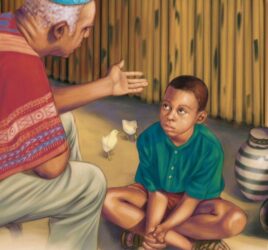Restful Hard Labor with a Grandson
Restoration in the Enduring Presence of Christ
By Graham Chipps.
It was hot. My grandson was around four at the time and keen to work with Grandpa; keen to help. For him, the nature of the work didn’t matter so much. This work was about relationship not productivity.
But for Grandpa, there were things to be done around the farm where this young bloke lived, lots of them, and so productivity was high on the agenda if the very few days of being there were to meet expectations!
Our task was to cut down soft-wooded umbrella trees, not native to the area, as these proliferate and disrupt the growth of other trees. We were to cut up the logs and use them to protect from erosion the embankment along the steep driveway that curved up the hill through the bush from the front gate to the house.
So we set off well equipped with bush-saw and axe, a large bottle of water, hats on our heads, and walked the short distance to the bush areas of the property where umbrella trees were many. It was too late in the morning for the bush wallabies that come down to eat grass in the dawn mists. The birds were orchestral as always. Fortunately, it was well into the summer and so there was little likelihood of being troubled by the two species of seriously venomous snakes that live on the property (King Brown and Red-bellied Black).
Within minutes it was clear that my grandson had a very different work ethic.
For him, work required much conversation, repetitious conversation like the movements of the saw, in which all details were required points for comment: the interesting way the sawdust gathered on the leaves below; the frequent explanations as to why he preferred to do it this way or that; the sidetrack ponderings about unrelated thoughts that are part of the free-association of one still free to just wonder.
For him, work required experimentation and the lessons learned by a thousand generations on the best usage of a saw were to be ignored. Furthermore, a comfortable position, or perhaps just a need to never stay more than a minute in any one position, was much more important than cutting on the correct side at the correct angle if we wanted the tree to fall in a particular direction.
I soon learned that four year olds, for all their bravado, have limited strength and coordination and it is best to keep one’s fingers at sufficient distance from the cut. I am now able to testify that a bush-saw dragged across one’s thumb hurts.
Perspiration was plentiful but patience even more so. It was slow work. It required concentration and attention to the details of what was happening as we shared the saw and took it in turns to cut down the trees and then cut them up into suitable lengths.
It was the work of presence far more than the work of productivity and achievement. We made good progress but being there surrounded by trees and bushes was essentially all about being with him and allowing both of us to be present to the other. The work was not allowed to dominate this slow and deliberate attentiveness to one another.
And so it became restful. Peaceful in its own way. Driven-ness gave way to just letting the slow rate of progress be what it must be.
If I had worked on my own, the productivity would have been greater but so would the weariness of body and soul. This work with my grandson drew out new quietness within; a lessening of the loud accumulated noises from months of busyness. There was stillness even as the saw moved back and forth – erratically – in the hands of my grandson.
I am not surprised that the monks and nuns of long ago in their devotion to Christ and His presence frequently took very seriously the slow and repetitious work of garden and kitchen. There is physical work that heals and restores. It is work that is intentional; not in achievement but in carefully paced attentiveness to the presence of the other. Here is a deliberate rhythm of attending to the details one by one together with thoughtful respect for the Other who shares in the experience.
This is renewal. This is the fine art of waiting – resting or restfully working – in the presence of God and finding His eagle-like strength. Yes, often it does mean complete physical stillness so that the soul can likewise be still: quiet enough to receive.
But there is a greater importance than quiet stillness. Being present not just being there. Being attentive to the presence of the Other. Attentiveness to another requires slowing down the pace of things and holding less tightly the other agendas we have brought with us. It means listening even to the chatter of a young boy or perhaps the sound of the wind in the trees and the small creatures that rustle the leaves across the ground or in welcoming the glasses of ice-water delivered by Grandma.
If hard labour with a small child brings a restful heart, how much more in all we do and all we are will determined attentiveness to the enduring presence of Christ restore our souls?



